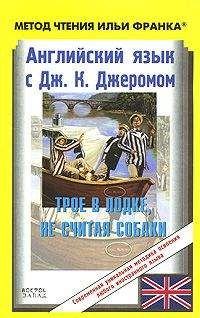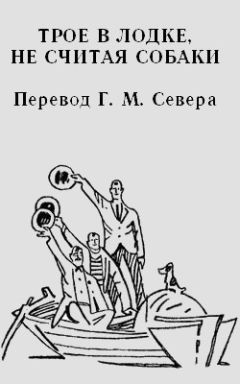Jerome Jerome - Английский язык с Джеромом К. Джеромом. Трое в лодке, не считая собаки
Sailing is a thing that wants knowledge and practice too — though, as a boy, I did not think so. I had an idea it came natural to a body, like rounders and touch. I knew another boy who held this view likewise, and so, one windy day, we thought we would try the sport. We were stopping down at Yarmouth, and we decided we would go for a trip up the Yare. We hired a sailing boat at the yard by the bridge, and started off. "It's rather a rough day," said the man to us, as we put off: "better take in a reef and luff sharp when you get round the bend."
We said we would make a point of it, and left him with a cheery "Good-morning," wondering to ourselves how you "luffed," and where we were to get a "reef" from, and what we were to do with it when we had got it.
We rowed until we were out of sight of the town (мы гребли, пока город не скрылся из виду), and then, with a wide stretch of water in front of us (затем, когда широкая полоса воды была перед нами), and the wind blowing a perfect hurricane across it (а ветер дул совершенным ураганом над ней), we felt that the time had come to commence operations (мы решили, что пришло время приступать к действиям).
Hector — I think that was his name — went on pulling while I unrolled the sail (Гектор — думаю, это было его имя = кажется, так его звали — продолжал грести, пока я развертывал парус). It seemed a complicated job, but I accomplished it at length (это оказалось трудной работой, но я справился с ней наконец; to accomplish — выполнять, завершать), and then came the question, which was the top end (и тут возник вопрос — который конец верхний)?
By a sort of natural instinct, we, of course, eventually decided that the bottom was the top (следуя своего рода врожденному инстинкту, мы, конечно, в итоге решили, что нижняя часть — это верхняя), and set to work to fix it upside-down (и принялись устанавливать парус вверх дном; to set to work — браться за работу, приниматься за дело). But it was a long time before we could get it up, either that way or any other way (но прошло много времени, прежде чем мы сумели его хоть как-то поднять). The impression on the mind of the sail seemed to be that we were playing at funerals (представление в уме паруса было = парус, видимо, решил, что мы играем в похороны; impression — ощущение, впечатление; понятие, мнение), and that I was the corpse and itself was the winding-sheet (и что я покойник, а он сам — саван).
hurricane [ˈhʌrɪkǝn; ˈhʌrɪkeɪn]
We rowed until we were out of sight of the town, and then, with a wide stretch of water in front of us, and the wind blowing a perfect hurricane across it, we felt that the time had come to commence operations.
Hector — I think that was his name — went on pulling while I unrolled the sail. It seemed a complicated job, but I accomplished it at length, and then came the question, which was the top end?
By a sort of natural instinct, we, of course, eventually decided that the bottom was the top, and set to work to fix it upside-down. But it was a long time before we could get it up, either that way or any other way. The impression on the mind of the sail seemed to be that we were playing at funerals, and that I was the corpse and itself was the winding-sheet.
When it found that this was not the idea, it hit me over the head with the boom, and refused to do anything (когда он обнаружил, что это не так, он ударил меня укосиной по голове и отказался делать что-либо; idea — идея; мысль; план, намерение; представление).
"Wet it (намочи его)," said Hector; "drop it over and get it wet (брось его за борт, пусть он намокнет)."
He said people in ships always wetted the sails before they put them up (он сказал, люди на кораблях всегда мочат паруса, прежде чем поднять их). So I wetted it; but that only made matters worse than they were before (и я намочил парус, но это лишь сделало дела хуже, чем они были раньше = но от этого стало только хуже). A dry sail clinging to your legs and wrapping itself round your head is not pleasant (сухой парус, льнущий к вашим ногам и обматывающийся вокруг головы — это неприятно), but, when the sail is sopping wet, it becomes quite vexing (но когда парус мокрый насквозь, это становится совсем досадно; sopping — мокрый, промокший /насквозь/; to sop — макать, промокать, впитывать; to vex — досаждать, возмущать, раздражать).
We did get the thing up at last, the two of us together (мы поставили его наконец общими усилиями: «двое из нас вместе»). We fixed it, not exactly upside down — more sideways like (мы установили его не совсем вверх дном — скорее, боком/вкось) — and we tied it up to the mast with the painter, which we cut off for the purpose (и привязали его к мачте фалинем, который отрезали для этой цели; painter — живописец; фалинь /веревка, крепящаяся к носу или корме шлюпки/).
wrapping [ˈræpɪŋ] purpose [ˈpǝ:pǝs]
When it found that this was not the idea, it hit me over the head with the boom, and refused to do anything.
"Wet it," said Hector; "drop it over and get it wet."
He said people in ships always wetted the sails before they put them up. So I wetted it; but that only made matters worse than they were before. A dry sail clinging to your legs and wrapping itself round your head is not pleasant, but, when the sail is sopping wet, it becomes quite vexing.
We did get the thing up at last, the two of us together. We fixed it, not exactly upside down — more sideways like — and we tied it up to the mast with the painter, which we cut off for the purpose.
That the boat did not upset I simply state as a fact (лодка не перевернулась — я просто констатирую факт; to state — заявлять, констатировать). Why it did not upset I am unable to offer any reason (почему она не перевернулась, я не могу предложить никакого объяснения; reason — разум; здравый смысл; причина, мотив). I have often thought about the matter since (я часто думал об этом /деле/ впоследствии), but I have never succeeded in arriving at any satisfactory explanation of the phenomenon (но мне ни разу не удалось прийти к какому-либо удовлетворительному объяснению этого явления; phenomenon — событие, феномен, явление).
Possibly the result may have been brought about by the natural obstinacy of all things in this world (возможно, такой результат был вызван естественным упрямством всех вещей в этом мире; to bring about — вызывать; приводить к, обусловливать). The boat may possibly have come to the conclusion (лодка, возможно, пришла к заключению), judging from a cursory view of our behaviour (исходя из беглого взгляда на наше поведение; to judge — судить; оценивать, делать вывод), that we had come out for a morning's suicide, and had thereupon determined to disappoint us (что мы выехали /на реку/ для утреннего самоубийства, и поэтому решила нас разочаровать). That is the only suggestion I can offer (это единственное предположение, которое я могу сделать).
By clinging like grim death to the gunwale (вцепившись отчаянно в планшир/ь/; like grim death — отчаянно, изо всех сил; gunwale — планшир/ь/, деревянные или металлические перила поверх судового леерного ограждения или фальшборта; деревянный брус с гнездами для уключин по бортам шлюпки), we just managed to keep inside the boat, but it was exhausting work (мы сумели остаться внутри лодки, но это было утомительным трудом). Hector said that pirates and other seafaring people generally lashed the rudder to something or other (Гектор сказал, что пираты и другие плавающие по морю люди обычно привязывают руль к чему-нибудь; seafaring — мореходный; относящийся к морякам; to lash — хлестать; крепко связывать, привязывать), and hauled in the main top-jib, during severe squalls (и убирают /главный верхний/ кливер во время резкого шквального ветра; to haul in — втягивать, выбирать; jib — кливер /косой треугольный парус, ставится впереди фок-мачты/), and thought we ought to try to do something of the kind (и думает, нам следует попробовать сделать что-нибудь в этом роде); but I was for letting her have her head to the wind (но я был за то, чтобы позволить ей /лодке/ идти по ветру).
phenomenon [fɪˈnɔmɪnǝn] suicide [ˈs(j)uɪsaɪd] exhausting [ɪɡˈzɔ:stɪŋ]
That the boat did not upset I simply state as a fact. Why it did not upset I am unable to offer any reason. I have often thought about the matter since, but I have never succeeded in arriving at any satisfactory explanation of the phenomenon.
Possibly the result may have been brought about by the natural obstinacy of all things in this world. The boat may possibly have come to the conclusion, judging from a cursory view of our behaviour, that we had come out for a morning's suicide, and had thereupon determined to disappoint us. That is the only suggestion I can offer.
By clinging like grim death to the gunwale, we just managed to keep inside the boat, but it was exhausting work. Hector said that pirates and other seafaring people generally lashed the rudder to something or other, and hauled in the main top-jib, during severe squalls, and thought we ought to try to do something of the kind; but I was for letting her have her head to the wind.
As my advice was by far the easiest to follow, we ended by adopting it (поскольку моему совету было намного легче последовать, мы закончили тем, что приняли его = так и сделали), and contrived to embrace the gunwale and give her her head (и решили ухватиться за планширь и предоставить ей /лодке/ свободу действий; to contrive — придумывать, изобретать; замышлять; ухитриться; to embrace — обнимать/ся/; окружать; to give head — не вмешиваться; предоставлять свободу действий).
The boat travelled up stream for about a mile at a pace I have never sailed at since, and don't want to again (лодка прошла по течению примерно милю с /такой/ скоростью, с какой я никогда не плавал с тех пор, да и не хотел бы снова; to travel — путешествовать; перемещаться, покрывать расстояние). Then, at a bend, she heeled over till half her sail was under water (потом, на повороте, она накренилась так, что половина ее паруса ушла под воду). Then she righted herself by a miracle and flew for a long low bank of soft mud (затем она выпрямилась каким-то чудом и полетела к длинной низкой отмели из мягкого ила; to fly; bank — берег; отмель, нанос).
That mud-bank saved us (эта илистая отмель спасла нас; mud-bank — илистая банка). The boat ploughed its way into the middle of it and then stuck (лодка врезалась в нее до половины и застряла; to plough — пахать, бороздить; прокладывать путь; врезаться; to stick). Finding that we were once more able to move according to our ideas (обнаружив, что мы снова можем двигаться согласно нашим мыслям = по нашей воле), instead of being pitched and thrown about like peas in a bladder (и нас не бросает и не трясет, словно горошины в мешке; to pitch — падать; подвергаться килевой качке; бросать; to throw about — разбрасывать, трясти; bladder — камера, пузырь, полость), we crept forward, and cut down the sail (мы подползли и срезали парус; to creep).
gunwale [ɡʌnl] plough [plau]



